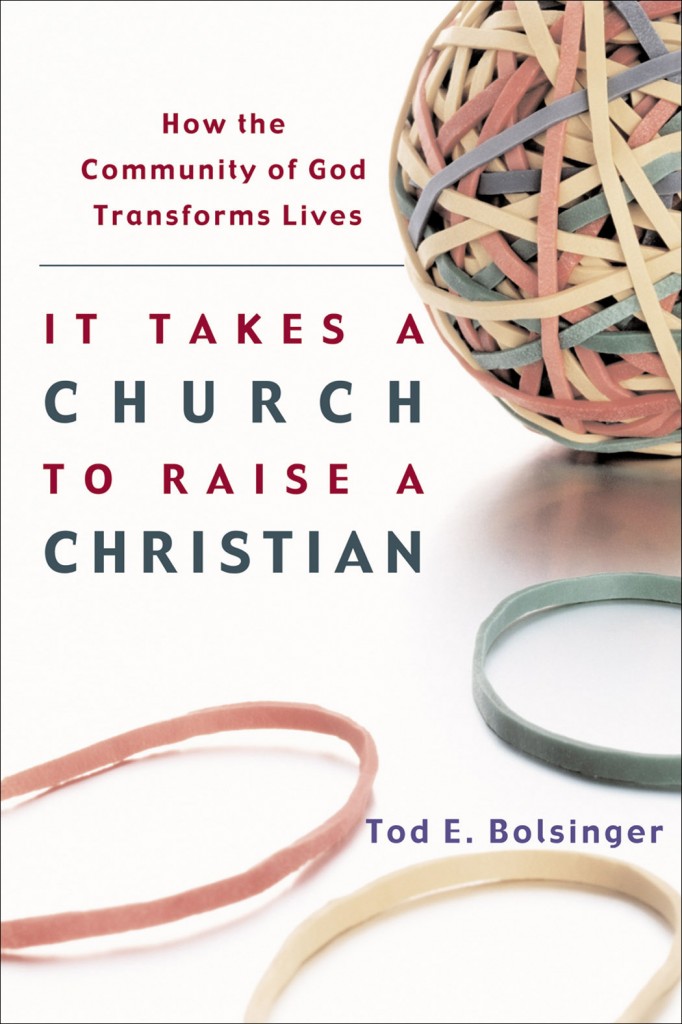Book Review: It Takes a Church to Raise a Christian, by Tod E. Bolsinger
March 5, 2010

March 5, 2010
“My primary thesis is that the change we most yearn for is available to us only through the Triune God who transforms his people within the divine community, the church—The People of the Table. I believe and want to convince you that ‘it takes a church to raise a Christian’” (22).
Bolsinger, a Presbyterian (USA) pastor in San Clemente, CA, admits that the book’s title is based on an African proverb made famous by Hillary Clinton. He likes to quote theologians like Moltmann, Pannenberg, Volf and modern writers like Dallas Willard. His mother is an elder in a Presbyterian church. Regarding his young daughter, Bolsinger says “I must admit sheepishly that I sometimes envision her someday becoming our church’s senior pastor” (27). Thus, Bolsinger is a typical 1990’s product of Fuller Seminary.11 . Bolsinger is not a thoroughgoing liberal, though. He treats Calvin as an authority (especially on the sacraments). And he seems to allow for the reality of hell (22), justification by faith (45) and the imputation of righteousness (121). He says that adults must be confessing Christians before they can join the church he pastors (162). Nevertheless, for all of his talk about the Lord’s Supper, he never alludes to the penal substitution to which it points.
I must say that a lot of Bolsinger’s analysis is on target. He strongly defends Christianity as a corporate movement. Excessive individualism has plagued the church in America. Bolsinger decries “salad-bar spirituality” where one picks and chooses from, say, Bible study at the Baptist church, worship at the Presbyterian church, and support groups at the Calvary Chapel. “The church is not just here to help you in your individual journey of faith” (24). Bolsinger believes that an overemphasis on small groups has reinforced a “do-it-yourself religion” (15). The corporate body is essential to believers’ transformation into the likeness of the Son of God. Simply drawing large numbers of people is not the answer, however. “While crowds come and go, true and enduring Christian community is a foretaste of heaven, the essence of discipleship, the enduring witness to an unbelieving world, and an absolute necessity for human transformation” (15). Bolsinger seeks to address what he calls a prevailing “weak ecclesiology” (166) in America. Indeed, these critiques of broader evangelicalism remind one of 9 Marks of a Healthy Church.
Another of Bolsinger’s sound observations is that the broader evangelical church in America, although it may hold to the authority and inerrancy of Scripture, actually does not commend Christianity to the world. People aren’t doing what the Word says. “Those who profess Christian faith have almost exactly the same lifestyle patterns as unbelievers” (30). This is one of Dallas Willard’s most potent critiques. Where Bolsinger and Willard err, however, is in their solution to the problem (discussed later).
Bolsinger should be commended in four other areas:
Unfortunately, the benefit of the foregoing is overshadowed by the following two concerns (and more could be mentioned).
Bolsinger accurately describes modern evangelicals as living indistinctly from the world. But his solution is faulty. He quotes Dallas Willard: “We have counted on preaching and teaching to form faith in the hearer…but, for whatever reason, this strategy has not turned out well. The result is that we have multitudes of professing Christians that may well be ready to die, but obviously are not ready to live, and can hardly get along with themselves, much less others.” (31)22 . As if he needed to reemphasize the point, the identical Willard block quote is found again on p. 111. Repeatedly, Bolsinger takes a swipe at preaching and doctrine (e.g., pp. 31, 99, 102, 111, 113, 140, etc.) The Trinitarian Word, emphasizes Bolsinger, is “bigger than the Bible” (113).. Bolsinger adds, “Christians assume that being ‘biblical’ will result in being sanctified, and yet that assumption seems highly questionable at best” (111). I, sadly, do not doubt Bolsinger’s diagnosis of hypocrisy in the American churches. But the cause is not too much Bible; rather, it is 1) the presence of reckless evangelism and unregenerate members;33 . Bolsinger criticizes a resurgent “neo-Anabaptist ecclesiology”. “A small church of pure souls is at best a short-term solution. It will either become an exclusive club or won’t be pure for long once it starts mass evangelization” (146). and 2) the absence of expositional preaching and church discipline. Bolsinger (and Willard) erroneously posit an “either/or”: either sound doctrine, or real community. The solution is “both/and”. They seem not to understand that the Bible (rightly understood and applied) promotes, indeed demands, a vibrant, loving community (1 John 4:20, etc.)
Worship, according to Bolsinger, would be strengthened if preaching and sacrament were more frequently linked together. He quotes Pannenberg (with approval): “The Eucharist, not the sermon, should be the center of church life…The sermon should serve, not dominate, in the church” (102). The Lord’s Supper should be observed much more frequently, and not only in the gathered assembly. Small groups are ideal for more frequent and intimate observance of communion (99, 187 n. 15). Bolsinger advocates home gatherings where communion is observed “as part of the meal itself” (129, 148). By no means do I wish to minimize the importance of the Lord’s Supper, but Bolsinger has lost perspective.
In summary, Bolsinger has identified nominal, hypocritical “Christianity” as the biggest challenge to the Christian witness in America today. His solution for reform correctly involves local assemblies of Christians. But where he stumbles is in pitting the community, and particularly the observance of the Lord’s Supper, against sound doctrine. We must have both, beginning with the right preaching of the Word.